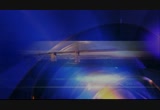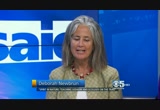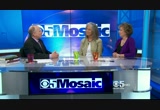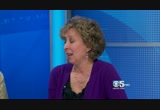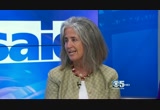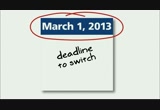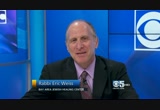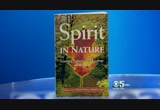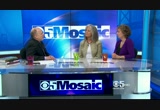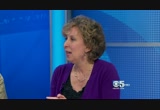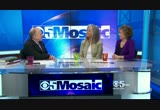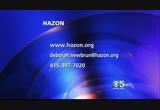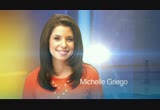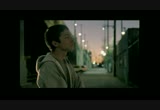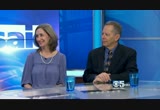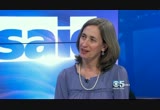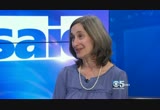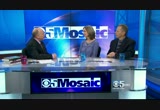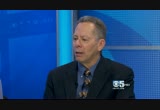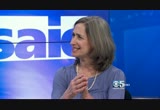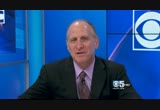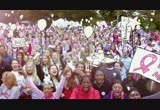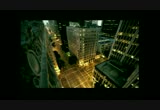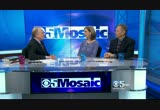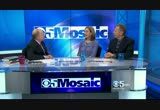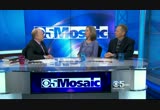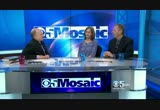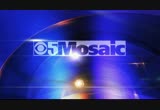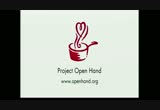tv Mosaic CBS October 21, 2012 5:00am-5:30am PDT
5:00 am
>> morning and welcome to mosaics. i am rabbi white. we are going to talk about books. fascinating to talk about how imagination enters into words on a piece of paper and send up in a book to read and enjoy whatever is on the written word. we have two special guests with us and we will ask you, and sandra, what is your book about. >> daisy's word, a children's back from ages 0 to 10, daisy loves words and keeps track of words in a green work book
5:01 am
covered with poke ca dots and word lists that she accumulates and she is a character that kids can relate to and i wanted to write a book to do with the theme of words but not academic. it is fun and brings into literature a character that is all about language that i have fun with myself and i find exciting. >> deb ra, what is your book about. >> my book is called spirit in nature teaching judiasm and ecology on the trail, it is a book to be used outside. when we wrote it in the cover, we said we hope it gets messy and full of the earth of leaves and grasses. i co-authored the book for jewish educators that did not know about nature and wanted to take kids outside and for naturalists that didn't know about judiasm, either type of person could pick up the book
5:02 am
and take people outside and teach people on jewish themes. >> what i think is interesting when we go to a book store or search the web and we see a book and a person's name or a couple of authors, i think we naturally assume well this person is an author in the traditional sense of writing but in fact both of you write out of different personal experiences and in that way seek to in some way educate and expose people to different ideas to break the model of a traditional full time author that makes a livelihood writing books. >> so i came to this through a background in journalism that has to do with words but a little different. i started at the standard daily and became a news assistant at the new york times in
5:03 am
washington d.c. i learned about the power and importance that words have in our culture, worked for newspapers in california and transition into children's books that has been a joy for me and different form at and i have to say that i feel like the luckyist person because in journalism, you have to make everything accurate i get to make everything up and it jumps into a more creative part of my energy that i enjoy very much. >> for me, i used to say i spend more in babysitting fees than i ever got as royalties from the books. i have been working my career for the national park service ranger and i directed for a number of years and i work for the largest jewish environmental organization.
5:04 am
i was looking for a tool to take children and adults out on hikes and engage them in learning. the curriculum has been in the secular world or native americans. there was nothing in our jewish tradition, no books so i wrote this more as a lesson plan, a tool that i needed and other jewish educators, the writing process was about what do i do, how do people like this outside and how can someone pick this up and use it, it is more totallian and enjoyable. >> i think books conceive both functions which is lovely, because i think people will enjoy it and use it. with mine i do have some ideas on my website for teachers and librarians and parents to use the books as a teaching tule in many ways because how we teach kids about words and develop the love of words and language
5:05 am
5:06 am
moment. >> welcome back to mosaic. i am rabbi white and honored to be your host. we are talking about books na have been written and what books actually mean to us in society and i'm wondering as you were thinking of writing the book, each of you and actually writing it and going through the whole process of editing and working with a publisher and seeing it on a
5:07 am
book shelf and internet, all of the different place where is people buy books, what were your hopes about what the reader would actually get out of what you were presenting? >> that's a really good question. it is such a long process from conception to actually writing, editing and my case illustrations being added to it and then actually holding a book in your hands. for me, since it is a children's book, what i really hoped that people would get out of it, is that i hoped that they would see the book and cover which i think is fun and delightful, my illustrator did a lovely job and be drawn to the character. a friend of mine sent me the most adorable pick that put the biggest smile of her 7-year-old daughter in bed reading my book and that's what i wanted. i wanted it to be a book that kids would take to bed and be eager to read and learn the story of. >> i would say the jewish environmental movement has so many aspects to it.
5:08 am
i'm involved with a lot of food work and climate change and alternatives to transportation, at the time of writing the book i was focused on how do you take people in the wilderness and appreciate the glory and beauty and connect with god. when i saw the cover of the book it was so much more beautiful than i imagined it to be. i had this really great experience of having the book been published awhile ago so i meet young adults in particular, educators who work with day school students and they say you wrote that book, i have that book, it is great. i use it. that was the intention that people would find very useful to help them connect jewish people with the outdoors and the mag jessty of the wilderness. >> the one thing out of my book is my character does create the word lists and she likes making up words. i saw on the internet, you were
5:09 am
talking about it so wonderful we are all connected now. a little girl in canada reviewed my book and said one thing she really liked about it was making up words. she put her favorite words and i thought that was delightful this world wide connection with something that i had put out there. >> there is so much conversation in the world at large about the internet and technology about the way we think and interaccurate and communicate, there is a lot of conversations about the impact of the internet on the way we read and how one reads on a computer screen and how one reads on newspaper and print and how one reads a book on a piece of paper. i'm wonder figure you can share some of your experience about how these sorts of things interact within the context of your particular book. >> well, i have to admit that i'm sort of hoping children's books will be the last batch
5:10 am
that will be printed. i think there is something lovely about a child and parent having something physical together and we are transitioning to an electronic age and there's a new generating learning to read on ipads and developing a love of reading in a different way. one of the great thing that technology has brought is that a, things get out there in a much bigger and faster way and you tend to hear back and hear feedback and people feel connected around literature, around what we are putting out in the world. that's really exciting. >> i think the e books, i mean certainly as environmentalist, the idea that we are not needing as much paper, we can have this tool and dowloading 15 novels and you can borrow books from the library on to your ipads and kindles and
5:11 am
those sorts of things. on the other hand, certainly the book i wrote was met to be taken out on the trail. so you don't have a computer or connectivity or that's the hope that if your in yosemite, you can pull the book out of the your back pack. i know that as an educator, we down load somebody's writing and we take it with us on a sheet of paper but it's hard to read from. i think a book is together better. some of these books are children's books that you hold it in your lap and a book like mine that you need to take it outside. >> i know, deborah, you work with an environmental agency that is important for people to know. >> yes, it is the largest jewish environmental organization in the country and we do work about sustainable behavior to create sustainable communities in the jewish world and talking about our food system and how are the animals,
5:12 am
we are talking about what is fit to eat at the jewish notion in the 21st century. we are hoping to change what it means to be jewish in the 21st century to change our behavior for sustain ability for door to door generations. >> you can go to www.h azon.org or contact deborah new brin at deborah newbrin@hazon or call (415)397-7020. sandra and deborah, thank you so very much for being with us, we are going to say goodbye and welcome two other authors in the meantime thank you for sharing your books and thoughts and please join us in one
5:15 am
moment on mosaic. welcome back to mosaic, i'm rabbi whyan honored to be your host. we are talking about books, about how an imaginative idea comes to a piece of paper on words, on the internet and joined by david pearlsteen and jennifer. david tell us about your books. >> this is nonfiction, nonisraelites encounters. these are nonisraelite characters that have encounters with god either direct or historically and they run from
5:16 am
igar and abraham's concubine and jobe and the other is a novel, slick, a political satire of the middle east and ties in, insofar as the protagonist actually is jewish although he never found that out until he was 40. >> jennifer. >> my book is a memoir and it is it is not fish nor fowl and half poetry and half personnel stories. i am very honored to have been published by cappa press, wonderful cappa press started in 1969 and just relaunching now with my memoir. and my memoir is divided into 7 sections, what i call family or my family of origin, marriage, children, body, faith, outside
5:17 am
or the outside world, and work. and there's a prol ogue and epilogue. it is a book about love and thankfulness and explains the title, when i was a freshman in college, i had a terrible very real feeling that i was not going to have a good life. this book is an extended rift on my surprise, my gratitude and i think i can say my hard work. and, in fact, creating a good life, receiving a wonderful life and having the blessings of truly a beautiful family. >> wonderful. it seems, jennifer and david that on the faces that each of
5:18 am
your respective books seem so different but on the other hand. all three books seem to have a theme of what it means to grow as a human being and what does it mean to interact and have relationships in the world that matter, that give growth, that give meaning, that allow for leaps of faith and otherwise living into a good life if we can use that term. would you say that those were some of the thing that you were thinking of when you were actually writing each of your respective books? >> the arc of the biblical story involves that growth, how do we live the right kind of life and become the kind of human being god has intended us to be but given us a choice in terms of how we live. for god's others, that's a natural and the stories in there explore that. slick is something else again. it is set in a contemporary
5:19 am
midwest in a persian setting and presents struggles that we are going through and societies going through, a struggle between two powers for brothers and people trying to make sense. an army officer has been there and done that and finds himself entrapped in forces greater than him and it really is about his growth, trying to discover who he is. as a human being and american and even as a jew. well, since my book is a memoir, it is literally about my life, it sort of explores how i started as a child and now i am 62 years old and both
5:20 am
that continuing thread and the enormous disjunctures as well. i have said in the prol ogue that i was born with a loving heart but life really at times shatters one heart. so this book, i think, it is about putting it back together and creating a mosaic almost, a hole that also has, you know, mortar and air and space between the pieces. my hope is that in my life and in my book and the experience that the readers have, that it is been inspiration to speak words of love, kindness, gratitude, words of sincerity and honesty. but words that are positive because i believe we are born with so many of them and it's our role and our life as we
5:21 am
grow, as we build, as we develop and as we deepen to focus on that which is positive, a lot of literature is about the negative, about the heart, about the crushing and the heart breaking. but my hope though this book has all of those elements, that the reader will come out feeling stretched as i did. >> jennifer and david, we need to take a quick break, please join us in a moment back here on mosaic.
5:23 am
5:24 am
that they have written. jennifer, it seems that people that write a letter or a note or even a grocery list, they might write an elaborate e- mail, when people write all of the time it seems to me the distinction between writing for publication and writing otherwise is when you actually end up looking for a publisher and get into the nitty-gritty of what that means. i'm wonder figure you can just share that piece of the behind the scenes process. how was it, david, to think of a publisher, look for a publisher and to make that decision about how to have your book published. the finding is difficult because everybody is writing but i independently published both universe, through i universe. the advantage is that not only does the book get out quickly but i had complete freedom to
5:25 am
do it the way i wanted to do it. nobody told me, no you cast do it this way, you have to do it that way. there are a lot of quality books being independently published, slick just earned the star from curtis reviews as a book of remarkable merit, very few books published by publishers earn that so that's a testament to the fact that the publishing industry is changing. authors today have many different ways to go. well, my book was published as a paperwork book. i wanted to be published by a publisher and i was so honored to be selected by capper press but it was a complicated process as i think they always are. i was approached by capper press, they wanted to work and consider publishing my manuscript but we ran into some
5:26 am
difficulties and i was rejected but i wanted to be published by them so badly, i will take the criticisms and i improved the book and december 1st we printed 800 and about to go into a second printing which is intriguing is that it is not available on amazon or barns and nobel.com. only at this point available through independent book sellers and bookstores. that will probably change in subsequent printings. i am a librarian by changing and i can't get past that love of books in my hands. >>is so wonderful for anybody for out there considering writing that for you to have published in nontraditional ways and yet ... >> this is part of the wave of
5:27 am
the future. standard publishing is not going out of business but so many options have been opened up to writers that if you want to write, you can do it, and have a book in your hands, god's others and slick, they are available at book stores and something that jennifer said is the need for every writer in effect to have an editor, when i was writing god's others, i had people looking at it and got a lot of help from rabbi weanner in san francisco and in writing slick and the other fiction i am working on now, i have had help from tom parter in palo alto and him saying i like this but consider this and that is helpful. >> david and jennifer, believe it or not we have come to the end of our time together.
5:28 am
120 Views
IN COLLECTIONS
KPIX (CBS) Television Archive
Television Archive  Television Archive News Search Service
Television Archive News Search Service 
Uploaded by TV Archive on

 Live Music Archive
Live Music Archive Librivox Free Audio
Librivox Free Audio Metropolitan Museum
Metropolitan Museum Cleveland Museum of Art
Cleveland Museum of Art Internet Arcade
Internet Arcade Console Living Room
Console Living Room Books to Borrow
Books to Borrow Open Library
Open Library TV News
TV News Understanding 9/11
Understanding 9/11